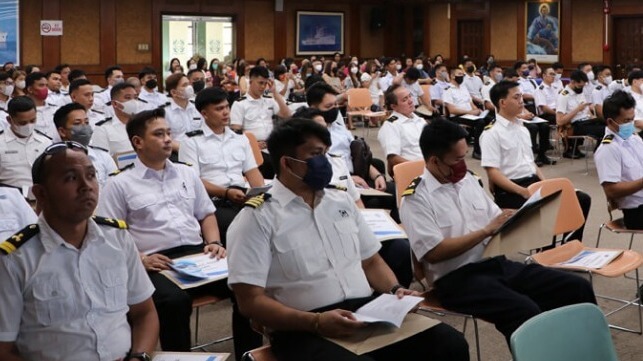Philippines Outlines New Initiatives to Improve Seafarer Training

Philippine authorities detailed a series of initiatives they are undertaking to ensure that seafarer training continues to improve in the country to meet the required international standards. The actions were outlined in the response to the announcement by the European Commission that it was satisfied with the efforts the Philippines is taking to address longstanding deficiencies in the country’s seafarer training programs. As part of its efforts the Philippines reports it has closed some of the privately-operated training schools.
Speaking at a briefing held at the presidential palace in Manila, representatives of the Maritime Industry Authority (MARINA) and the Commission on Higher Education (CHEd) said they were dedicated to continuing the efforts to enhance the training programs and ensure that Filipino seafarers had the education and support required.
The EU in 2022 reported it was considering ending the recognition of Filipino seafarers and their certificates after the European Maritime Safety Agency (EMSA) issued a new report detailing deficiencies in the country’s standards of training and certification. The agency updated its list of concerns from an effort that dated back to 2006 with some reports saying the Philippines had failed 17 annual inspections. EMSA’s report specified that the training and certification in Philippine maritime education institutions fell short of the guidelines mandated by the International Convention on Standards of Training, Certification and Watchkeeping for Seafarers.
Training in the Philippines is provided by privately run schools supervised by the government agencies. Philippines President Ferdinand Marcos Jr. called for a number of steps in response to the EU and the shipping industry including the maritime unions assisted by forming an advisory council. At the end of March, the EU concluded that the measures taken by the Philippines and its responses to the inquiry “demonstrated concrete progress and improvement,” in its programs to comply with the STCW Convention.
“The recognition is good for ten years, subject to reassessment and monitoring by EMSA,” the chief of MARINA said. “So that’s why we have also to conduct regular training and capacity building for our stakeholders and or marine personnel.”
The agency reported that it has already shut down 15 maritime training programs due to non-compliance. In addition, starting in 2022 they put in place a five-year moratorium on opening new programs. They said the purpose of the ban was so that they could focus on the existing programs as well as enhance the country’s standards.
The maritime and educational authorities are working together with the industry on enhancing the required curriculum for the training programs. They said they would also be hiring more monitors to inspect the programs noting that there are “a lot of maritime schools” in the Philippines.
“We must be able to monitor all the maritime schools not just in implementing the curriculum but making sure they have the equipment that is necessary, they have competent teachers, they have good facilities so that the intended competencies and outcomes can be measured correctly and satisfy the standards of EMSA,” said CHED Chairperson J. Prospero De Vera III.

that matters most
Get the latest maritime news delivered to your inbox daily.
Other efforts include developing a new assessment test to determine the preparedness of the candidates for the maritime programs. MARINA said it would also be partnering with the Philippine Coast Guard for the monitoring and evaluation of the education institutions. The Department of Transportation has also requested the Overseas Workers Welfare Administration investigate providing further training for career advancement. The government said it will ensure that shipboard training is available.
The training of Filipino seafarers and the recognition of their certificates is critical in an industry where they make up a significant portion of the workforce. The EC noted that roughly 50,000 Filipino masters and officers are currently working on EU-flagged ships while estimates have ranged between a fifth and a quarter of all seafarers working in international commercial shipping are Filipinos.
